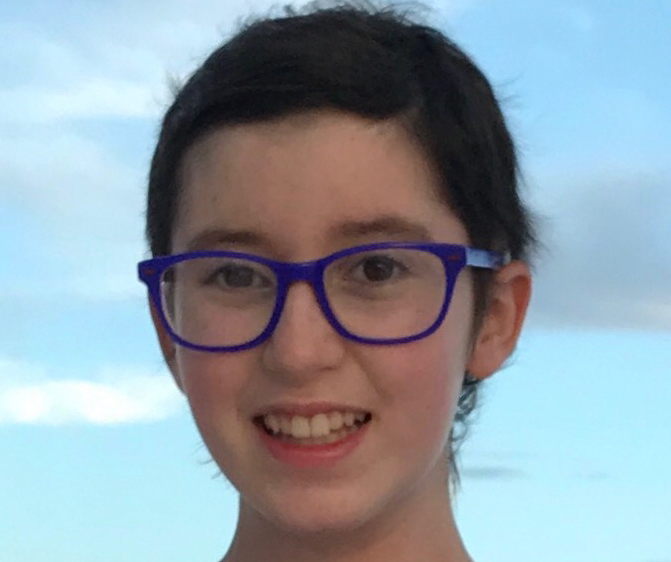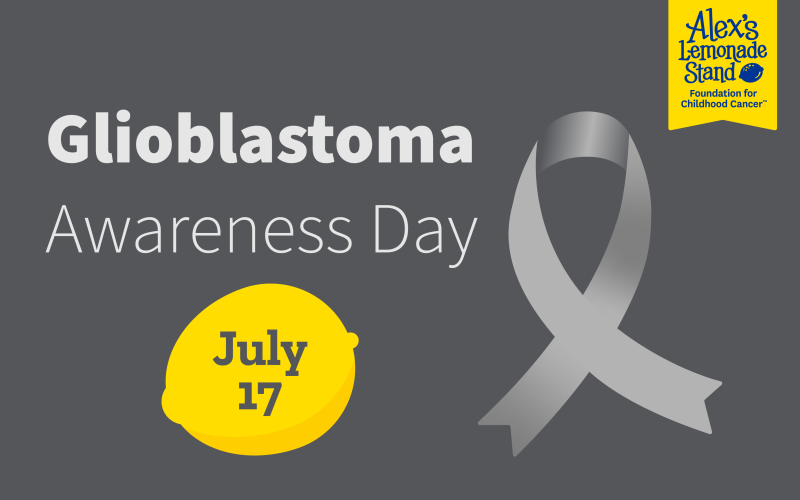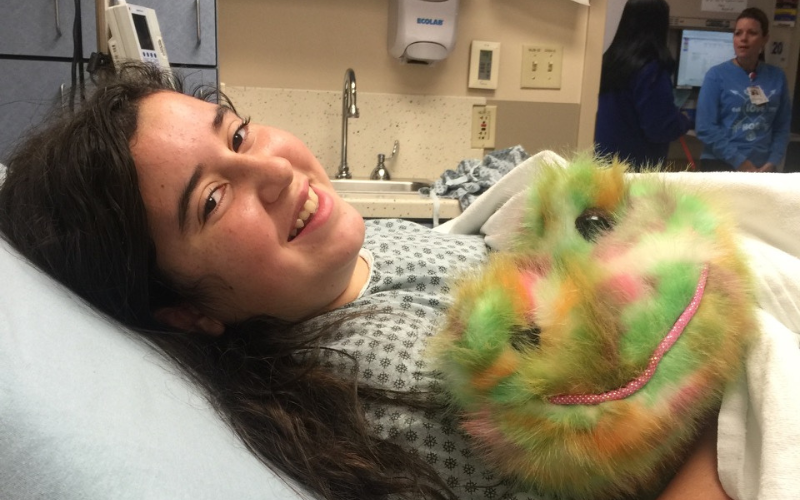By: Trish Adkins
While playing goalie for her soccer team in April 2016, Chloe Cox, a super bright 12-year-old from Texarkana, Texas, was kicked in the head. She stood up holding her head, but seemed okay.
In the weeks that followed, Chloe began to have horrible headaches. Her family doctor diagnosed her with a mild concussion, with instructions to return if the headaches continued or got worse. The headaches persisted, and her doctor sent her to the emergency room for a CT scan.
Within one hour, the family had a diagnosis: there was a tumor the size of a walnut near her pineal gland — a gland deep inside the brain tucked between the two hemispheres that produces melatonin, which the body uses to regulate sleep cycles. Doctors told Chloe’s parents that they were lucky they found the tumor now — all thanks to that kick in the head during soccer. Any further delay in treatment and Chloe could have died.
 Chloe had surgery that evening to relieve the pressure in her brain and to biopsy the tumor. While the family waited on results and for the next steps, Chloe’s oldest sister got married with Chloe right by her side. The biopsy revealed that Chloe had glioblastoma, with rare histone mutations. This already rare, fast-growing tumor was now classified as even rarer.
Chloe had surgery that evening to relieve the pressure in her brain and to biopsy the tumor. While the family waited on results and for the next steps, Chloe’s oldest sister got married with Chloe right by her side. The biopsy revealed that Chloe had glioblastoma, with rare histone mutations. This already rare, fast-growing tumor was now classified as even rarer.
The next week, Chloe had a tumor resection removing 75-80% of the tumor. Then, Chloe was sent 300 miles away to M.D. Anderson, in Houston, Texas for radiation treatment. Chloe finished 7 1/2 weeks of radiation and continued treatment in a clinical trial, in an effort to eradicate the disease and give Chloe her childhood back.
Chloe’s mom, Michelle, left her business and her job of 30 years to be with her daughter during treatment. It was a clear choice; the family had health insurance through Michelle’s husband and Michelle needed to be there for her daughter in a way she never expected.
“I am so grateful to have had the opportunity to be able to be by her side every day. I truly enjoyed our one-on-one time and we have laughed a lot together and cried a little too,” said Michelle.
The void left by Michelle’s income in the family finances was large. Even as their local community rallied around the Cox family, the expense of travel was looming. Chloe and her family made several trips, sometimes for weeks at a time or multiple times during a month, to M.D. Anderson. Michelle knew they needed more support to ensure they could afford to get Chloe to the treatment she needed.
“The ALSF Travel for Care team stepped up immediately with funding for our hotel expenses. Providing our family with the support we needed to stay together during Chloe’s treatment,” said Michelle.
Chloe’s family is like many childhood cancer families — who have to travel great distances, multiple times a year and even multiple times in one week for treatment, consultations, medications and surgeries. Pediatric oncology care is so specialized. Even families close to a major cancer center may have to travel a distance to reach the most promising treatments. ALSF’s Travel For Care program provides qualifying families with travel grants that help children and their families get to clinical trials at facilities across the United States.
Chloe’s cancer — glioblastoma — typically occurs in adults and is a fast-growing tumor. Chloe’s tumor tripled in size between brain surgeries. There are no known cures, but Chloe was determined to beat the disease and pave the way for breakthroughs for other children battling rare brain tumors.
Michelle searched for a clinical trial that could save her daughter’s life, but she never found one.
Chloe, who loved her family, loved to draw and always went out of her way to do whatever she could to help a friend in need, died on July 26, 2017 — 13 months after her diagnosis.
“She was a survivor and a conqueror. Chloe was a force to be reckoned with. Her amazing strength and faith is something that many adults, including me, wish they had,” said Michelle.
Michelle hasn’t given up on her search and she won’t until all families have the cure her daughter was denied.
“This is a war worth fighting for other families. Our children need more options. Our doctors need funding for more research,” said Michelle.
About Glioblastoma
Every July 17 is Glioblastoma Awareness Day. For children diagnosed with glioblastoma, current treatment options are limited in effectiveness and availability. After relapse, the disease tends to progress extremely quickly.
“Often there isn’t much time for a new or experimental therapy to make an impact. So if a new drug shows promising results in early-phase clinical trials, it would be a good strategy to move it to up-front therapy early so that kids are less sick and have more of a chance to respond,” said Theodore Johnson, MD/PhD an ALSF-funded researcher from Georgia Health Sciences University Research Institute in Augusta.
Dr. Johnson is currently studying the promise of immunotherapy for children with relapsed brain tumors, including glioblastoma in a clinical trial for a specialized immunotherapy, used in combination with chemotherapy and radiation.
Immunotherapy refers to a range of treatments that work to harness the body’s immune system to attack tumor cells.
Learn more about the ALSF-funded projects ALSF that study glioblastoma. And donate, today, to make more research possible now and into the future by joining our One Cup At a Time Club.



